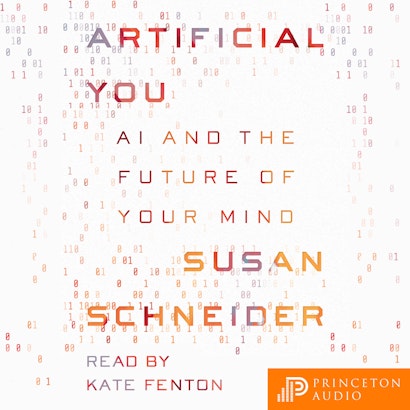Humans may not be Earth’s most intelligent beings for much longer: the world champions of chess, Go, and Jeopardy! are now all AIs. Given the rapid pace of progress in AI, many predict that it could advance to human-level intelligence within the next several decades. From there, it could quickly outpace human intelligence. What do these developments mean for the future of the mind?
In Artificial You, Susan Schneider says that it is inevitable that AI will take intelligence in new directions, but urges that it is up to us to carve out a sensible path forward. As AI technology turns inward, reshaping the brain, as well as outward, potentially creating machine minds, it is crucial to beware. Homo sapiens, as mind designers, will be playing with “tools” they do not understand how to use: the self, the mind, and consciousness. Schneider argues that an insufficient grasp of the nature of these entities could undermine the use of AI and brain enhancement technology, bringing about the demise or suffering of conscious beings. To flourish, we must grasp the philosophical issues lying beneath the algorithms.
At the heart of her exploration is a sober-minded discussion of what AI can truly achieve: Can robots really be conscious? Can we merge with AI, as tech leaders like Elon Musk and Ray Kurzweil suggest? Is the mind just a program? Examining these thorny issues, Schneider proposes ways we can test for machine consciousness, questions whether consciousness is an unavoidable byproduct of sophisticated intelligence, and considers the overall dangers of creating machine minds.
Awards and Recognition
- One of Forbes' Must-Read Brain Books of 2019
- Finalist for the PROSE Award in Philosophy, Association of American Publishers
"Packed with material that enlightens new ways of thinking about a hot topic. . . . a philosophical tour with real-world implications and it’ll appeal most to readers who enjoy playing out scenarios. . . . One of the benefits of learning about AI is better understanding the human mind, and this book—while challenging—offers an accessible, enjoyable intro for both."—David DiSalvo, Forbes
"Schneider is a sure-footed and witty guide to slippery ethical terrain. Her exposition of the consciousness problem is laced with helpful examples. It pries clarity from the essential opacity of its central concepts, most important consciousness itself. And it is refreshingly candid."—Aziz Huq, Washington Post
"[A] demanding dialogue between philosophy and science."—Andrew Robinson, Nature
"[A] well-reasoned and thoughtful discussion about the need for AI researchers and policymakers to place more emphasis on the question of consciousness."—Martin De Saulles, Times Higher Education
"This is a fun, provocative, thoughtful and interesting book to read. . . . As we rush, almost unthinkingly into an AI enhanced world this is a book that is well worth reading."—Simon Cocking, Irish Tech News
"This book is a delight to read. Deeply satisfying: a double prolonged plea for humility as we explore questions [of AI and the nature of consciousness]. A stimulating and accessible blend of neuroethical speculation and provocation, all deriving from a deeply felt moral mission. In short, highly recommend."—John Banja, AJOB Neuroscience
"Accessible and intriguing. . . . A significant contribution to some of the often-overlooked ethical issues surrounding the continued development of artificial intelligence."—Ken Daley, The Philosopher’s Magazine
"This riveting book is both entertaining and profound: it presents a humane perspective on AI, a topic that has attracted too much naive hype and scaremongering. Classic philosophical problems of the self, the mind, and consciousness will soon—through transformative advances in AI—become crucial to practical ethics and individual choices. Schneider offers sophisticated insights on what is perhaps the number one long-term challenge confronting humanity."—Martin Rees, author of On the Future: Prospects for Humanity
"Is artificial consciousness possible? Could you become an AI? Would you still be you? Schneider makes a vivid and compelling case that the future of humanity may depend on the answers to these philosophical questions. Artificial You is brimming with useful tools for thinking about the mind and its future."—David J. Chalmers, author of The Conscious Mind: In Search of a Fundamental Theory
"A fascinating exploration of human-level AI and brain enhancement, combined with a passionate argument for the importance of philosophy in understanding what on earth we are doing when we pursue these lines of research."—Stuart Russell, author of Human Compatible: Artificial Intelligence and the Problem of Control
"What does it take to have a mind and be a conscious being? Could AI have a mind? Could it have a conscious mind? Might the best plan be for us to merge with our best AIs? Artificial You is a smart, bite-sized tour de force of the state of play in philosophy and science. Before you request your next mind design upgrade, read this book."—Andy Clark, author of Surfing Uncertainty: Prediction, Action, and the Embodied Mind
“As we stride eagerly into a near-future realm populated by augmented humans and artificial intelligence, Schneider probes the minefield ahead, posing stark choices that humanity will face.” —David Brin, Hugo award–winning author of Existence and The Transparent Society
"AI, metaphysics, and the future of life in the universe—Schneider writes about the biggest issues of our time with an engagingly light touch, and enviable insight and clarity. Highly recommended."—Huw Price, academic director of the Leverhulme Centre for the Future of Intelligence and co-founder of the Centre for the Study of Existential Risk
"This timely and exciting book explores issues at the intersection of philosophy of mind and philosophy of technology. Cautiously optimistic about transhumanism and conscious artificial intelligence, Schneider articulates an interesting, coherent perspective. I know of no other book that combines such a high level of quality and accessibility on these topics. Artificial You is terrific."—Eric Schwitzgebel, The Splintered Mind blog and author of Perplexities of Consciousness

